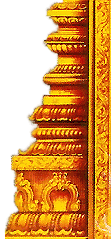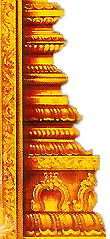Lord Ranganatha graces in a reclining form as He did on the Milk Ocean. Lord Brahmma is not in the naval chord. It is believed that Lord Brahmma worships the Lord just before sunrise each day. Chandra Theertham that cleanses the devotees of His/her sins is within the temple. Lord grants the Muthangi Sevai darshan to devotees for six days after the Vaikunda Ekadasi festival. This is a very famous event in the temple. A priest of the temple threw a stone on Tiruppanazhwar (one of the 12 Vaishnavite saints) Perumal had it on His bleeding forehead and granted salvation to Azhwar in this temple.
Daughter of a king of Delhi was too devoted to the Lord. To remember her, Lord is dressed with Lungi the Muslim dhoti and Roti is offered as nivedhana on Ekadasi and new moon days. Brahmmotsavam is celebrated thrice a year during January-February, February-March and April-May. The temple is believed to have come into being from the milk ocean. This is one of the Swayambu Kshetras with Lord facing south. The vimana of the Lord is covered with gold.
Except Madhura Kavi Azhwar, all Vaishnavite saints had sung the glory of the Lord of the temple. Of the 108 Divya desas, Sri Rangam the first and Tiruchirupuliyur the 11th are the only ones facing south. Vaishnava Acharya Sri Ramanuja stayed here rendering his services to the Lord and also attained salvation here. His disciples interned the Acharya in a sitting form. After some time, Acharya came alive resurrected in the same form. Tirumanjanam is not performed. There is a separate shrine for Sri Ramanuja. On the Arudra star day in Chithirai month (April-May), a blend of kumkum and other
items are applied on the Acharya.
On the Kaisika Ekadasi falling on the full moon fortnight in the month of Karthikai (November-December) an event of covering the Lord with 365 blankets is celebrated throughout the night. This is said to make up for the errors committed in the day-to-day clothing of the Lord during the other days of the year. As November-December happens to be winter, it is also said that the event is followed as a token of the love of devotees to comfort the Lord from the cold weather.
Aani Jeshtabishek is performed to Lord (abishek with perfumed oil) with Sandal water. Same day, abishek is performed to Namperumal the procession deity after removing the gold coverings. Abishek to Namperumal is performed with 22 pots of Cauvery water. It is said Mother Cauvery Herself performs the abishek to Lord Namperumal. Abishek on other days are performed without removing the golden coverings.
Aadi Perukku Utsav is celebrated on the 48th day of the Jeshtabishek to Lord on the Aani Jeshta star day. This is celebrated on Aadi 18 or 28 in some years. Lord graces from the Amma Mandap and offers gifts to Mother Cauvery with silk sari, bangles, betels etc. This is taken on an elephant and dropped in the flowing river.
While staging the Kamba Ramayana in the temple, some objected to the mention of Lord Sri Narasimha in the Ramavatar story. Kambar said that he would withdraw this part of the epic, if Lord Himself so demanded. Lord Sri Narasimha emerged from a pillar and approved Kambar’s writing as true. Lord Narasimha in the temple graces from a separate shrine in the name of Mettazhagia Singar near the Mother’s shrine. The mandap where Ramayana Arangettram took place is opposite the Mother’s shrine. Lord Narasimha is holding only the conch. No discus.
Three Brahmmotsavam is celebrated in the temple during Chithirai (April-May), Thai (January-February) and Panguni (March-April). Lord Brahmma celebrated the Brahmmotsava for Lord Ranganatha in Panguni in His Satyaloka which is called the Aadhi (first or original) Brahmmotsava. Uthiram star falls during this festival when the Lord graces darshan with Mother Ranganayaki. The Thai Brahmmotsava relates to the one celebrated by Lord Sri Rama in Ayodhya. As Rama is considered Lord of Earth, this festival is also called Bhoopathi Festival. It is considered that Lord Rama Himself is still celebrating this festival.
There is a shrine for Sri Garudazhwar (eagle vehicle of Lord Vishnu) holding the nectar pot and also the Vedas handed over to him by Perumal after recovering them from the demons. The idol is made of Salagrama. Devotees offer dal, jaggery and sweet pudding balls as nivedhana to Sri Garuda. Special pujas are performed to Him on Garuda Panchami day.
Dhanyalakshmi: A separate shrine is dedicated to Mother Dhanyalakshmi in the prakara of Anna Perumal temple. Mother Dhanyalakshmi graces with Lord Krishna on the right and Lord Narasimha on the left. Those afflicted with adverse aspect of planet Venus (Shukra) worship Mother with while silk sari, garland of white flowers and offer white pulse as nivedhana. During the Brahmmotsava, Lord Ranganatha visits this shrine and enjoys the paddy measuring event.
Lord Anna Perumal (Lord of Food) has His shrine in the second prakara, holding a staff, pot and a ball of rice. It is believed that worshipping Perumal in the shrine would keep the devotees free from hunger.
30 metre dhoti to Sri Garuda: 25 feet tall Sri Garuda graces His Vishwarupa darshan opposite the Lord Ranganatha shrine. He appears in such a majestic form ready to take off with the Lord wearing Ashta Nagabaranam a jewel of 8 serprents). The dhoti vastra of Sri Garuda is 30 meter long. Abishek is not performed to Sri Garuda. Kozhukkattai the sweet pudding balls are offered as nivedhana on Thursdays. Sugriva and Angatha are the dwarapalakas – securities in the shrine. A festival for him is celebrated on the Margazhi Tiruvadirai star day.
The temple also has a shrine for Danwanthiri, Lord of medicines, with Mother Mahalakshmi on His chest. He holds conch and discus in His hands and also a leech. Those suffering from prolonged diseases light lamps with castor oil. Offer curd rice as nivedhana. On Fridays, a perfume paste called Punugu is applied on Lord Ranganatha. Along with nivedhanas, a medicine made of dry ginger and jaggery is also offered to the Lord for digestion. It is believed hat Lord Danwanthiri Himself offers this medicinal preparation. Also a medicinal preparation is used for the abishek of Lord on the seventh day of Brahmmotsavam festival.
Three mothers in the shrine: While traditionally Perumal is seen in Vishnu temples with Mothers Sridevi and Bhoodevi, Mother Ranganayaki Thayar (Thayar-Mother) in the temple is a procession deity with Sridevi and Bhoodevi behind Her in the same shrine. During Arati to Mother, drum instruments are also played.
Lord Sri Ranganathar graces in a reclining form. The naval chord with Lord Brahmma is absent. Yet, it is believed that Lord Brahmma invisibly worships the Lord just before sunrise every day. Muthangi Sevai during the six days after Vaikunda Ekadasi is a grand event in the temple.
Srirangam is the sacred soil where the Lord granted salvation to saint Tiruppanazhwar accepting the stone aimed at him by a priest of the temple. Remembering the devotion of the daughter of a Delhi king, Lord is dressed in Lungi with Roti nivedhana on new moon and Ekadasi days. |





